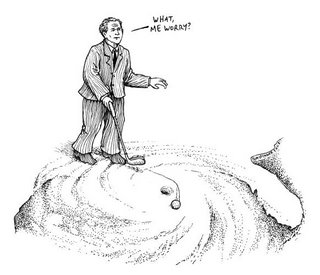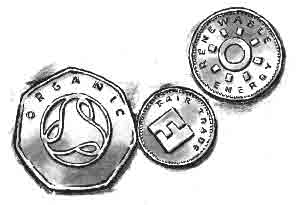
Welcome one and all to this week's Carnival of the Green, brought to you by the letters D and k and the number 42.
The Carnival of the Green is a digest of the best environmentally minded posts from around the blogosphere, which appears on a different blog every week. The carnival was kicked off by
City Hippy and
Triple Pundit and is now booked up until March 2007! If anybody's interested in hosting sometime thereafter it's those guys you need to get in touch with. I'm sure they'd be delighted to hear from you. If you just want to submit a post for consideration, then you can wing your submissions in the general direction of
carnivalofgreen@gmail.com and the interweb will do the rest.
As I said, the carnival is a digest of posts from around the blogosphere which is a pretty big place. Humungous, in fact. As such, there's a lot of green bloggery out there. The sheer volume of material behooved me to try and force the hugely diverse array of submissions into some kind of structure. Coming up with something sensible, coherent, useful and interesting wasn't as simple as I'd initially thought. The following is the compromise that I settled on, for better or worse. So, with no further ado, let's get on with it...
Paint Me A Picture
There's a lot of stuff about the world that many of us think isn't quite right. If we want to do anything about that - and if you don't, I question why you're wasting your time here - then we first need to understand exactly what's wrong. This is exactly (which is to say, moreorless) what the posts in this section do.
Tena Rubio (
National Radio Project (NRP) and the
Greener Magazine Network) hosts a radio discussion looking at the world's
depleting water resources and the increasing difficulty experienced by many people in accessing potable water.
Joel Makower (
WorldChanging) points out that one of the ironies of current concerns about water scarcity is that it isn't just hitting the poor, increasingly the rich are
going thirsty as well.
Environmentalists have long warned that as water becomes scarcer we can expect to see a consequent upsurge in conflict, which brings us to Jason Godesky (
The Anthropik Network), who has a compelling post
arguing that, contrary to the claims of Israeli propagandists and most "commentators," the recent assault on Lebanon wasn't about self-defence, but rather the latest Israeli water war.
Sticking with the Middle East, that handsome, charming
Disillusioned kid returns to the
environmental consequences of Israel's decision to bomb the Jiyyeh power station in Lebanon and surveys the incipient efforts to clear up the mess.
When Katrina hit New Orleans last year it was "the eleventh named storm, fifth hurricane, third major hurricane, and second Category 5 hurricane of the 2005 Atlantic season." This year, the National Hurricane Centre in the US is currently tracking Debbie, only the fourth storm deemed worthy of a name in 2006. Which poses the question, where are the hurricanes? Dave Cohen (
The Oil Drum) does some research and
concludes their holidaying in the Pacific.
Not so long ago, it seemed that being a climate change "sceptic" was quite trendy. Fortunately, it seems that's not longer the case. Calvin Jones (
Climate Change Action) lists some of the
prominent sceptics who've seen the (solar-powered) light.
Jbruno (
The Voltage Gate) deals with the
mess more commonly referred to as the Chesapeake Bay.
Inexplicably, not everybody appreciates environmentalists' good looks and charming demeanour. Karli, a member of Greenpeace's
Defending Our Mediterranean team, documents the Rainbow Warrior's
run-in with a few irate tuna fishermen.
Will Potter (
Green is the New Red) muses on the
impact of "eco-terrorism" rhetoric on and within the environmental and animal rights movements.
Our Glorious Leaders
As green issues have become increasingly trendy in the UK, the people who regard themselves as our "leaders" have found that not only are there costs to ignoring such concerns, but that it might actually be in their interests to jump on the (bio-diesel-powered) bandwagon. All too often, however, such new found commitment to the ecological cause is (recycled) paper-thin. Elsewhere, their counterparts don't even feel the need to pretend they care. Whichever side of the fence your "representatives" come down on, their impact on the environment - whether for good or ill - can be considerable.
Riversider (
Save the Ribble) has a look at some
promises made by local councillors and seems less than overwhelmed.
As LibDem leader Menzies Campell gets caught with his pants down over low-energy lightbulbs, Michael G. Richard (
Treehugger) wonders if we might be moving into the era of the "
eco-scandal".
Over the other side of the pond, Odiyya (
The Conscious Earth) reports that the Conservative Government in Canada are "
rewriting history and removing all mentions of Kyoto and global warming from federal websites."
Just over the border in the Good Ol' US of A, David Roberts (
Grist Magazine), notes that the Bushies have finally gotten around to introducing their first
energy efficiency measures, but doesn't think they've gone far enough. He also suggests that energy efficiency is an issue "enviros" (that's us) should make more of a fuss about.
More encouragingly, Sally (
Veggie Revolution), brings news that legislators in Chicago have decided to
ban foie gras, because of the cruelties inflicted on geese and ducks in order to produce the stuff.
Predictably, not everyone agrees that the ban is a good idea. Eric (
An Animal-Friendly Life) isn't particularly impressed by
Time's response and even suggests something to do about it.
The Blogs They Are A Changin'
Having established what's wrong and established where are leaders position themselves vis-a-vis the salient issues, there is a widespread perception that the daily assaults on our environment behoove us to take action. The question is what and how? As with everything else nowdays, bloggers are at the forefront of these debates. If you don't believe me, take a look at some of the posts below.
The guys over at
Real Climate have been looking into the results of a recent Zogby poll on
public attitudes in the US to global warming and the linkages between the phenomenon and severe weather. They draw some interesting conclusions about what scientists should take from the poll which are likely to be of interest to environmentalists as well.
As if to prove my point, Jeff McIntire (
Sustainablog) reflects on the Real Climate post and
ponders on how far environmentalists should concern themselves with promoting "the finer points" of global warming.
Aaron Newton (
Groovy Green) wonders whether peak oil and the laws of economics might be incompatible and when - or if - somebody's going to
do something about it.
Nick Aster, the purveyor of
Triple Pundit (0ne of the co-conspirators in the inception of the carnival in front of you), explains why he thinks that
repairing the Hetch Hetchy resevoir (the construction of which submerged a beautiful and pristine valley) shouldn't be at the top of environmentalists' wish lists right now.
Morgen Jahnke has a "guest article" at
Interesting Thing of the Day (which may or may not strictly speaking be a blog) in which she explains that in 1972, the king of Bhutan, Jigme Singye Wangchuck decided that his country wasn't going to follow the crowd and measure Gross Domestic Product (GDP) like everyone else. Instead they would measure
Gross National Happiness (GNH). Apparently - and who am I to say otherwise? - this has had benefits for the country's population and environment. Could the same thing work elsewhere?
It's often said that, given the size of its population, that China could cancel out any efforts made by the rest of the world to confront climate change. It is heartening therefore to read Nathan Wyeth (
It's Getting Hot in Here) reports from Bejing where he has had the opportunity to
meet with students concerned about global warming and trying to do something about it.
Ricardo (
Ricardo's blog), considers the
possibilities of using ethanol as a fuel. Apparently, the idea's really taking off in his native Brazil.
Encouraging people to enjoy woodland has got to be a good thing, right? Not neccesarily. Carel Brest van Kempen (
Rigor Vitae) is sceptical about the establishment of "open spaces" which seek to do this, arguing that while their may be benefits, there are also costs and that building an asphalt path through a forest may be many things, but it
certainly isn't conservation.
The Personal is Political

The phrase/slogan/truism "the personal is political," was popularised by the feminist and women's liberation movements who were seeking to break down the barriers errected by patriarchy between conventional conceptions of "politics" and the oppression women experienced in day-to-day life. To a considerable extent the concept, if not the phrase itself, has also taken hold within large swathes of the green movement, with advocates articulating steps which individuals can take to respond to the destruction of our environment. Blogging being a predominantly solitary activity, it shouldn't be surprising that such ideas have considerable currency within the green blogosphere.
Al (
City Hippy), poses his usual weekly thought-provoking question and this week he wants to know which
one green action you would do whilst forsaking all others? Some of the posts in this section have some interesting things to say on this point so don't rush to answer just yet.
Its axiomatic that air-travel isn't very green, but how many of us would be prepared to go as far for our commitment to the environment as Barbara Haddrill who works at the
Centre for Alternative Technology (CAT) and is travellingthe 3,608 miles from Cardiff to Australia to be a bridesmaid at her friend's wedding by land and sea? Not many I would suggest. You can follow her adventures on her blog
Babs To Brisbane (And Back).
Roger B (
Words & Pictures) discusses
how people react when they discover he doesn't have a car.
Sticking with cars, John Rozewicki (
Supreme Narcissism) explains why
hybrid cars are for losers (because electric cars are for winners, apparently).
Moving away from transport for a moment, Tracy Stokes (
The Eco Street) has a round-up of off-the-peg
ecologically friendly homes in the UK.
Environmentalism and alcohol, what more could you ask for? Frank (
Sludgie) explains all, including how he got
attacked with garlic while discovering the linkages.
One of the easiest ways individuals can feel they're doing something about the problems of the world. Elisa Camahort (
The Hip and Zen Pen) has discovered a site purporting to tell you the financial health of charitable organisations, encouraging you to give to those they deem financially healthy, but should that be the only criteria people consider before giving? Elisa
thinks not.
Of course, as Steve Ballogh (
Groovy Green) points out, going green isn't really the challenge. It's
staying green that's difficult.
While nobody's questioning the sincerity underlying many of the efforts outlined above, not everybody thinks that focussing on personal choices is an entirely sound basis for environmental politics. Lenin (
Lenin's Tomb), for instance,
isn't very keen on a new TV ad produced by Greenpeace to discourage people from using 4x4s for precisely that reason.
Assorted Miscellania
Some things just don't fit into neat and tidy categories. Those things go here.
Jacob (
Salamander Candy) has been busy reading Jared Diamond's,
Collapse: How Societies Chose to Fail or Succeed and he's been kind enough to
pen a review in case anybody was thinking about doing the same thing, but wasn't sure if it was going to be there cup of (fairtrade) tea.
Following the terrorist alert earlier this month, a plethora of new rules were brought in about what could and couldn't be taken onboard planes as hand luggage. This not only created a great deal of confusion, but generated a large quantity of waste, as people dumped stuff they couldn't take with them. Amy Stodghill (
It's The Environment Stupid) reveals that some conscientious souls in Eugene, Oregon decided they weren't going to see all this unused produce go to landfill and went
dumpster diving for shampoo and shaving cream, in order to distribute it at a local family centre.
Starre (
Eco-Chick) has a gander at some of the celebrities
getting involved in this environment thang by means of an introduction to the new
Ecorazzi site which promises "the latest in green gossip".
Don Bosch (
The Evangelical Ecologist) offers a post full of "
fact and faith filled links" which must surely have been written with the intention of getting into the miscellania section. How can you resist the allure of "psycho killer racoons"?
And finally... Wiseman (
be sustainable) provides some light relief courtesy of
Al Gore and Bender the robot.
The Obligatory Bit at the EndWell that's about all we've got time for. It only remains for me to thank those who have written posts for the carnival, those of you kind enough to send me submissions, City Hippy and Triple Pundit for kicking the carnival off way back when and, of course, those of you who've taken the time to read the foregoing. I trust it wasn't
too painful
The carnival will be back, same time(ish) next week over at
LA Green Living. If you've developed a taste for this carni malarkey, why not check out last week's episode at
Frugal for Life or any of the previous efforts helpfully listed
here. If you're really fastidious you might care to check out
The Carnival of Empty Cages which is focussed on animal rights and veganism , the self-explanatory
Carnival of the Feminists or indeed any of the
ridiculous number of carnivals out there.
 Drax may sound like a character from a dodgy 1950s B-Movie, but it is in fact the name of a power station located near Selby, North Yorkshire. Drax is noteworthy because it is the largest single electricity producer in the UK, producing around 7-8% of the country's energy needs. It generates this power by burning coal, an infamously dirty process. According to the Times, in 2006 Drax produced 20.8 million tonnes of carbon dioxide. To put that number into some context, that means it pumps more carbon into the atmosphere than 103 nations each do.
Drax may sound like a character from a dodgy 1950s B-Movie, but it is in fact the name of a power station located near Selby, North Yorkshire. Drax is noteworthy because it is the largest single electricity producer in the UK, producing around 7-8% of the country's energy needs. It generates this power by burning coal, an infamously dirty process. According to the Times, in 2006 Drax produced 20.8 million tonnes of carbon dioxide. To put that number into some context, that means it pumps more carbon into the atmosphere than 103 nations each do. According to the Beeb, 38 people have been arrested so far, with the police claiming that the majority of these took place outside the plant. Alleged offences (which Auntie describes simply as "offences") include "criminal damage, aggravated trespass and possession of offensive weapons", although some have campaigners have contended that articles seized on the basis they were weapons include a fork and a penknife (hardly an unusual piece of equipment if you're camping).
According to the Beeb, 38 people have been arrested so far, with the police claiming that the majority of these took place outside the plant. Alleged offences (which Auntie describes simply as "offences") include "criminal damage, aggravated trespass and possession of offensive weapons", although some have campaigners have contended that articles seized on the basis they were weapons include a fork and a penknife (hardly an unusual piece of equipment if you're camping).





























